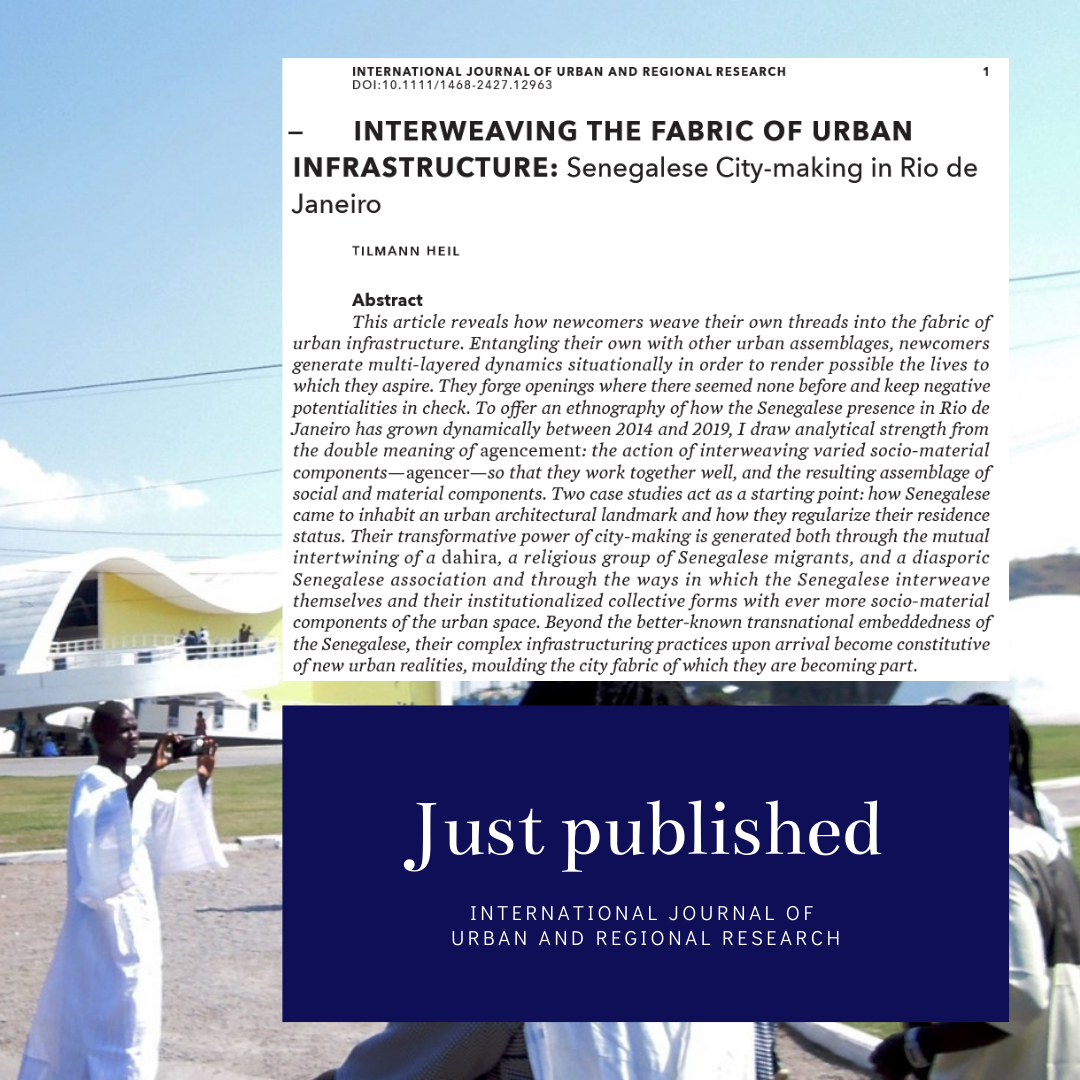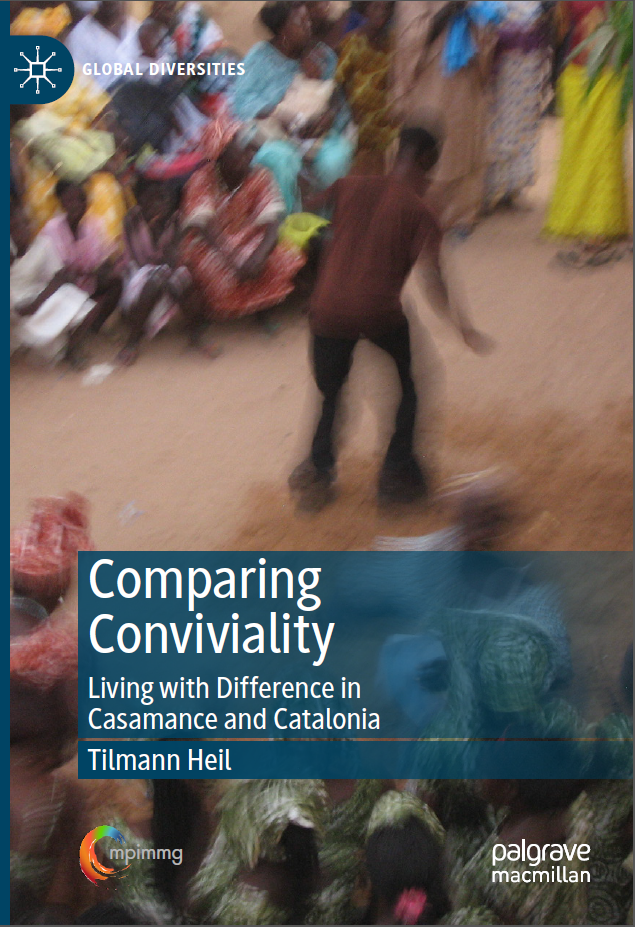|
It's a long journey that comes to an end as an #openaccess article in IJURR (doi.org/10.1111/1468-2427.12963).
I was fascinated how newcomers make the city according to their tastes, needs, visions, and projects weaving threads together that have not been connected before. I focus on the action of interweaving - or agencer - in which they connect themselves and their collective forms of organization to religious, social, political and material elements of urban space. First and foremost, I thank my interlocutors with whom I learned about the multiple Rios that emerge from complex lives lived in the multiple tensions in place. The article sheds light onto the process of arrival that is at the basis of my project Valued Difference that I have developed over the last years in Rio de Janeiro, on which you can read here.
As a key part of my research for the book Comparing Conviviality, I reflect on the differences between me and my interlocutors, my privilege and the commonalities we identified and challenges we faced. The relations we forged throughout the research process and beyond materialized at the intersection of race, origin, class, world view and outlook, among others.
Impressions from the presentation and debate of Comparing Conviviality at the Núcleo Interdisciplinar de Estudos Migratórios (NIEM), IPPUR, Universidade Federal do Rio de Janeiro, in March 2020.
The sound at the beginning and end are from ZigFest in 2010 in Ziguinchor, Senegal which I discuss in Chapter 4: Staged and sensous. If ever you do not have access to the book through your institution, please get in touch.
The book Comparing Conviviality takes the claim to a better knowledge and practice of how to live with difference foreward that Senegalese migrants in Catalonia made. Pursuing such non-hegemonic knowledge during 18-month of multi-sited, ethnographic fieldwork in Casamance, Senegal, and Catalonia, Spain, this quest has led to the formulation of an unstable concept: conviviality.
Impressions from the presentation and debate of Comparing Conviviality at the Núcleo Interdisciplinar de Estudos Migratórios (NIEM), IPPUR, Universidade Federal do Rio de Janeiro, in March 2020.
The sound at the beginning and end are from ZigFest in 2010 in Ziguinchor, Senegal which I discuss in Chapter 4: Staged and sensous. If ever you do not have access to the book through your institution, please get in touch.
My work on migration accross one of the most unequal geographies in the world, the Mediterranean, was driven by the dissatisfaction with how the people were mainly framed: victims, criminals, or undeserving 'bogus' refugees. These debates are often driven by the problem of Europeans to deal with those who are different at their doorstep. My book Comparing Conviviality shifts this debate, engaging with the knowledge of mobile Africans and how they live with difference.
Impressions from the presentation and debate of Comparing Conviviality at the Núcleo Interdisciplinar de Estudos Migratórios (NIEM), IPPUR, Universidade Federal do Rio de Janeiro, in March 2020.
The sound at the beginning and end are from ZigFest in 2010 in Ziguinchor, Senegal which I discuss in Chapter 4: Staged and sensous. If ever you do not have access to the book through your institution, please get in touch. in International Journal of Urban and Regional Research (IJURR)
Early View, pdf Abstract This article reveals how newcomers weave their own threads into the fabric of urban infrastructure. Entangling their own with other urban assemblages, newcomers generate multi‐layered dynamics situationally in order to render possible the lives to which they aspire. They forge openings where there seemed none before and keep negative potentialities in check. To offer an ethnography of how the Senegalese presence in Rio de Janeiro has grown dynamically between 2014 and 2019, I draw analytical strength from the double meaning of agencement: the action of interweaving varied socio‐material components--agencer--so that they work together well, and the resulting assemblage of social and material components. Two case studies act as a starting point: how Senegalese came to inhabit an urban architectural landmark and how they regularize their residence status. Their transformative power of city‐making is generated both through the mutual intertwining of a dahira, a religious group of Senegalese migrants, and a diasporic Senegalese association and through the ways in which the Senegalese interweave themselves and their institutionalized collective forms with ever more socio‐material components of the urban space. Beyond the better‐known transnational embeddedness of the Senegalese, their complex infrastructuring practices upon arrival become constitutive of new urban realities, moulding the city fabric of which they are becoming part. Post/colonial reconfigurations. The disregarded, renewed arrival of Spaniards in Rio de Janeiro7/4/2020
in International Journal of Immigration and Refugee Studies
accepted Abstract Given the renewed arrival of Spanish migrants in Brazil since 2008, I analyse how post/colonial power relations are re/configured and contradictions produced when legal and economic precarity question status hierarchies based on origin, race, and class. Brazil currently hosts the largest number of illegalised Spaniards worldwide. Illegality and precarity contest the favourable effects of nearly unconditional whiteness in Brazil and globally racialised, colonial power hierarchies. Derived from 2.5 years of ethnographic fieldwork in Rio de Janeiro since 2014, my interlocutors’ trajectories show how they struggle with and embrace the urban fabric and its structural post/colonial configuration. Keywords Brazil, postcolonial, whiteness, Europeanness, precarity, coloniality, status, hierarchy
Núcleo Interdisciplinar de Estudos Migratórios, IPPUR, Universidade Federal do Rio de Janeiro
During the second discussion of my monograph Comparing Conviviality during the first meeting of the Interdisciplinary Group on Migration Studies at the Federal University of Rio de Janeiro, I conveyed a long story in a nutshell: how my thinking on conviviality is grounded in representations and practices of neigbhourliness and cohabitation that make it necessary and possible to arrive at a concept of living with difference that frames forms of minimal sociality in unstable, uncertain, and changing urban contexts. This contrasts to Stuart Hall's characterisation of most of our concepts, which social sciences came up with to give us the impression of a stability that in actual fact never existed. Conviviality instead is meant to be a simple tool to speak of such complex and challenging situations and describe how human sociality unfolds in them.
I thank my colleagues from the Research Group and other participants for their interest and appreciation, especially Prof. Miriam da Silveira Santos who kicked off her comments with: 'I have accompanied Tilmann's work for some years now; no I finally understood what he does. He goes back to a key dimension of anthropology: that of comparison.' It resonated with Prof. Joana Bahia observation how I pay attention the fact that our interlocutors in the field - in my case transnational Senegalese from the Casamance region - are the true masters of comparison.
in Migration Studies [Open Access]
with Fran Meissner Abstract In light of current experiences with migration-driven diversification, is it still conducive to think about the effects of international migration by advocating for immigrant integration? This article argues that there are key problems with European uses of immigrant integration logics that cannot be resolved through redefinitions or reappropriations of the term. Even highly refined notions of immigrant integration misconstrue the role and relevance of differences in diversity dynamics. Immigrant integration further risks concealing and perpetuating power dynamics and (colonial) hierarchies. These continue to shape the social relevance of differences. Analytically thinking about superdiversity directs us to paying more attention to disintegration, a notion that cannot be reduced and measured by way of individual or group performance. To be able to usefully engage with disintegration, we argue that it needs to be divorced from ideas about social fragmentation and social collapse. To do this, we draw on recent developments in the literature on conviviality to emphasise the relational practices, power asymmetries, and materialities that enter into negotiations of difference. Convivial disintegration aptly addresses continuously reconfiguring and uncertain social environments. Our article thus provides a deromanticised and enabling provocation for easing integration anxieties. in African Diaspora 11 (1-2): 53-70
Abstract Based on my time with im/mobile West Africans in Senegal and Spain since 2007, I propose conviviality to conceptualise the complexity of my interlocutors’ local and diasporic tactics and views of living with difference. Simple everyday encounters such as greeting and dwelling in urban spaces serve to disentangle their various levels of reflection, habitual expectations and tactical action. They had local to global reference frameworks at their disposal. Not pretending to represent their knowledge, I discuss the inspirations I received from trying to understand what they shared with me non/verbally regarding living with difference. To start from this decentred set of premises challenges established Western/Northern politics of living with difference. Through conviviality, I show a distinct way of engaging multiple and overlapping ways of differentiating and homogenising practices and raise awareness for the importance and feasibility of minimal socialities in diasporic configurations, transnational migrations and the respective local urban contexts. link
in Mecila Working Paper 14 (full text)
Abstract Current academic usages of the notion of conviviality often carry a normative connotation in which it is opposed to tension and conflict. Instead, I propose to use conviviality as an analytical term; This everyday living together is characterized by tensions, contradictions, and inconsistencies that complicate abstract theorization and the use of clearly defined concepts whose role is, as Stuart Hall once suggested, to give us a good night’s rest by feigning a stability we long for. If conviviality is, as I suggest, understood as a notion that embraces the inconsistencies, multiplicities, and complexities of new urban ways, I inquire into the emerging relationalities between recently-arrived Senegalese and their social context in Rio de Janeiro under the impact of multiple hierarchical orders, including race, origin, education, and class. in Ethnography (full text)
Abstract For recently arrived West African migrants in the metropolitan area of Rio de Janeiro, the virtual and street encounters with travesti sex workers and queer beach goers provoked questions of relative power and status as experienced from a social margin of local Brazilian society. Based on ethnographic fieldwork since 2014, I address the question of how my Muslim interlocutors’ encounter with queers facilitate a particular and partial reading of Brazilian social relations, their legal mediation and their individual and social valuations. Moving between queer, postcolonial, queer of color and Muslim queer scholarship, I situate the local encounters of Muslim West Africans and queer subjects to differentiate and transcend the global framework of homonationalism and queer necropolitics. Situational positionalities result from the interplay of multiple geographical and social locations that, in their contradictions and interdependencies, are characteristic of contemporary urban configurations. Keywords inequality; hierarchy; margin; queer; homonationalism; Muslim; Brazil; West Africa; Murids; Rio de Janeiro |


 RSS Feed
RSS Feed